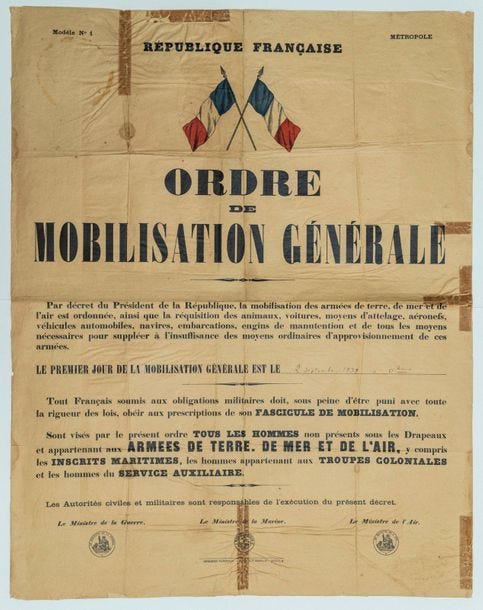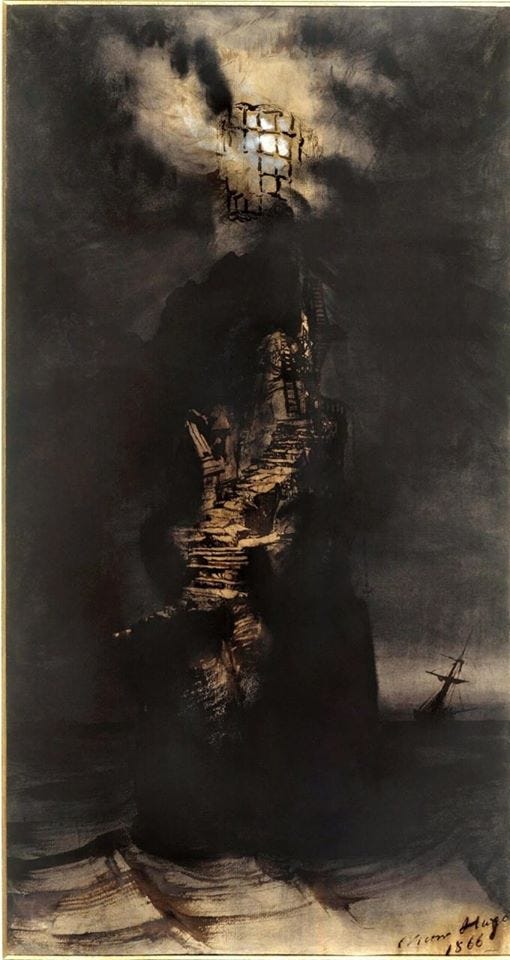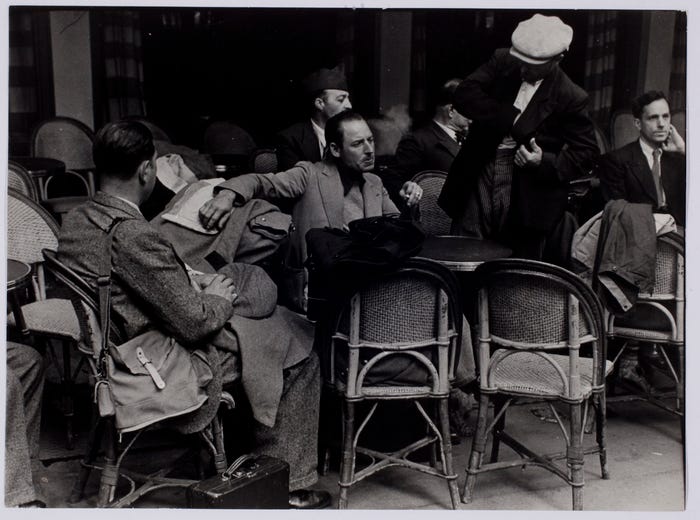Zalman Schneerson - Chapter 1 - Paris at War
Wisdom of our Fathers, Rabbi Hillel: “In a place where there are no men, strive to be a man.”
On the subject of A Letter from Zalman Mendelivich Schneerson to Meir Yankelevich Dizengoff.
This is prose written by Zalman Schneerson. Somewhat ambitiously, we can call it a novella. Although it’s a mixed genre. Evidently, there are only two “surviving” chapters. And they discuss very different subjects, the first chapter is in Paris and the second in Kremenchug, both chapters autobiographical. There is also a philosophical addendum that Zalman called “Thinking out loud”. In this post, I will translate Chapter One. Some of it was written at least after 1943, he mentions the year in the text. Maybe parts are written in real time. Hard to tell exactly. But the main theme of joining the French army was a real question that Zalman faced in 1939.
The text is narrated in a beautiful, cultured, flowing Russian, rich with authentic dialogue. Zalman Schneerson was an educated, well-read, gifted writer captured in the body of a sincere Rabbi. In this, he was similar to Rayaz, minus the sincere. But more so, there is a panache in the way the text and the dialogue develops. The text that grew out of the great Russian literally tradition, the Russian literary century, out of “War and Peace”, not forgeries or propaganda.
This work is from the Zalman Schneerson archive given to YIVO by his daughter Hadassah Carlebach. But no one knew what it was until now.
This is what they call in Russian, to the dismay of some readers here, интеллигентный человек. It seems the character of this man is a touch obsessive (more than a touch), but he faced the most important question of his life, and he tackled it extremely honestly. In fact, this way of thinking, martyrdom for a common goal, is self understood in the Russian culture, but rarely seen in the Jewish culture, that is predominantly selfish. In the Jewish tradition, the sanctioned, exhibitionist sacrifice is only a smokescreen for a personal gain.
Read carefully, note Zalman’s argument with a “schoolmate friend”, he is quarreling with the Jewish culture. He is struggling with what it means to be a Jew.
Apologies, as this translation doesn’t come to the organic level of the mame loshen, plus the typos.
Chapter One
Paris, September 1939.
The War has begun.
Association des Israelites Pratiquants is a modest Jewish organization mostly for immigrants étrange, established in 1936.
What does the organization do? It organizes small synagogues, religious schools for children. Many adults, young people, and children study in the organization. They speak and write about religion. During the war, the modest means organization helped with food. But politics, absolutely not.1
Ages 18 to 45 considered eligible to go to the front. And everyone accepts this with a calm confidence. Nobody has the slightest doubt about the need for this measure, or the slightest regret for the fate.
You will say, of course, it is natural. The Germans are persecutors, tormentors of Jews, and it is natural that the Jews want to join the army fighting the Germans. I agree with you that this is more than natural. And at the same time, please accept my testimony and do not doubt its honesty: Jews, other foreigners living in France, joined the army willingly, out of gratitude to France, which accepted them. They were happy to perform acts that are normally up to the children of the homeland.
Jews are a grateful people.
I understand, reading this, some of you will say: “Who asked them”? Oh, I heard this question many times. I understand you. Antisemites are asking, and I don’t agree with you. Not only from the perspective of the antisemite. No, I don't think you’re right, even from the perspective of your nationalism. Especially during the war. You know, of course, that I'm not a Communist. Let’s see how they do this in the Soviet Russia. How they accept a foreigner when they need him. Especially during the war. Oh, how they can talk. They understand that this is international. Everyone is needed, their own and the strangers.2
This is the country, this is France, France… How much more excitement there is this word for the whole world, more so even than for the French themselves. How much more enchanting, more visible is this is from the outside. How many people and nations could you attract? You are not interested? You are mistaken.
I knew France from the books of Victor Hugo. In the fog, in the turbulent seas, in the darkness where you couldn’t see, from afar flickered the lights of France. The lights of barricades, civil courage and the law, beckoned the lights of truth and nobleness.
When I discovered that Victor Hugo was not so popular in France itself, I was deeply offended.
But I digress…
The end of 1939.
I met a Jew, a man between 24 -28 years old. I don’t remember his face or his name… He was helping me without much success to find a taxi.
- What should I do, Mr. Rabbi? - - Clearly, go to the army. - - And why? - -? ? You live here, you used to live here - - I didn't live here, I suffered here. Have I been given the right to work?- - Yes, but still, you haven't found another place that will accept you… Here you were given "azil" [?]. You must also protect your people. You're going to defend yourself. - Yes, I want to protect my country, the Palestine. This is what I want to do. - So you think that if Europe falls, there will be Palestine. You don't understand that no small nation can defend itself. You're wrong.-
We broke up. His words did not impress me. Mine, I don't know. He might think I'm a bad Jew, a bad Rabbi. Who knows.
The end of 1939…
Another separate case. I was sitting with one of my friends in the big zal of our association. They told me about the young man who came to see me. And he has never seen me before. He came to me in a hurry. His expression was subdued, his voice unsteady, generally half-depressed. He appeared as an intelligent person. I invited him to sit down and tell me what it was.
“I heard that you, Mister Rabbi, you and your friends so to speak, are encouraging people to join the army. But I have the special case. Even though I speak Russian, I am a Polish Jew and I must go to the Polish army. My brother already serving there. We have an old mother who has nobody besides my brother and me. The antisemitic polish officers, they treat my brother terribly. They insult him at every step. How can I abandon my old mother and join “them”?
“I don’t understand you. So if the officer is polite, you're ready to join the army and sacrifice your life? Only the politeness of the officers is enough for this? But if the officers are disrespectful, then you don’t want to die?”
“Yes, I understand, the point is not the politeness of the officers. But you will agree if Ijoin the army then they treat you like that, it’s like a bucket of cold water. And also my mother, etc.”
He spoke quietly, with the trembling voice, tears in his eyes.
I responded: “Young man, you are depressed, so at this moment you are a very bad soldier. In this state, it is very difficult to win the war. You have to go to the army, and presently you are preoccupied with secondary questions”.
I turn to my previous conversation and this young man somehow fades away. My friend looks at me surprised. He is astonished by my firmness and certainty.
Rabbi Schneerson, oh Rabbi Schneerson, in 41,42 and 43, how often have you remembered this departed young man? You remembered this man, and it made you uncomfortable, Rabbi Schneerson?
One more case…
One of my schoolmates, and then an American citizen, got stuck in Paris at the outbreak of the war, where he was waiting for a first opportunity to return to America.3
Deeply religious person, with the impeccable moral standing [purity]. We were friends and were honest with each other. Observing my attitude towards joining the army and listening to my responses, he shuddered. He couldn’t contain himself.
I do not understand you, what are you saying? He looks at me with his piercing eyes. I am quiet. I don't respond. It's difficult to respond. I must think. I understand him. Furthermore, I can imagine his opinion about me. He is thinking: 1) Every person, every nation, has a mission in life. - ZS: I agree. 2)Mission of the Jews – religion. - ZS: I agree, oh I agree. 3) Antisemitism of Germans is politics. They don't mean Jews specially, it's how they fool the world. If it were only us, they word would let us bleed [without getting involved]. - ZS: Perhaps, I agree. 4) And so the world is fighting. There are occupiers and defenders. And we are suffering in the middle of these conflicts. We are the scapegoat. So, why we, having a mission in life, we have to increase our looses by being caught in the middle of these fights? - ZS: Careful, Careful, I need to think about this. But they are beating us? What is the difference, why are they beating us? Where they attack, you have to defend yourself. Some defend their territory, others defend their lives. Could he be right? Could he be right. (I stop our conversion).
He repeats, “What are you saying?” He looks at me and I understand that he see a bad Jew.
I am a bad Jew. My expression changes, I don’t respond. I have to rethink everything, before we met, how did I come to my standpoint?
Certainly, it’s basic. All must unite in fight, all those who are defending themselves. Only united, we can win the war. What he tells me about the so called the “sons of the heaven”. What is he telling me about some super humans? Who are they? Certainly, not the religious philistines. What is this alien religion? And maybe he will tell me that people who spend time in cafés without purpose, and it is they who carry the sacred fire? Let him not go, let him reserve himself for the holy mission. But I, I will go to war if they accept me. Even though I am older than 40 and I have a bad leg. Let me shed my blood. But with G. help, if I survive, I will manage to do something in this country, for religion. I will have my rights, equal among equals. To be clear, so that we foreigners have equal rights, citizenship in France, we must defend its borders.
Don’t say that because of the love for the country that is not your motherland, you are a stranger in the country, you risk your life. But for the right to have equal rights. But what if they kill you in the unknown field, (for some reason I imagined a small provincial station).
And what will happen to your prospects? After all, you can be useful. And who exactly needs your blood? Oh, how painful it is... Those who have their homeland, their country, their territory, it's all simple for them. They were attacked, they are defending themselves.
No - I'm still right. There are decisions that are made separately, but only make sense when you consider them together.
1) Germans torment Jews. 2) Jews foreigners in France love their country. 3) Foreigners in France defending it will be called the sons of this country after the war.
Everyone should join the army. This is clear, of course. But, I have started sweating before I finished my thought…
One morning I remember in our circles, there was a sort of psychosis, you could hear “Everyone should go sign up, everyone, everyone…”4
I am walking past the Police Stations. A long line, many Jews. I get closer, long and difficult wait. A young man comes out and screams, “Foreigners to the right”, “Foreigners to the left” or “Foreigners after”. I do not believe it. Like a bucket of cold water. Who is saying those words in front of me? This is the Polish man that I treated so coldly and curtly.
Of course, all this is nonsense, this is just an episode. Of course…
If this was not the time to speak about politics, when?
Zalman didn’t understand and didn’t know about the full extent of the Gulag, the murder of the best Generals and officers.
Who is this man? I have the feeling that Ramash would speak like that. The man who only engaged in conflicts that were absolutely safe for the “higher purpose”. And the second there was a potential loss involved, he ran. Like “mi hu yehudy”, etc. What other “schoolmate” was in Paris in 1939?
This sounds like a dream.






"azil" must mean the French "asile" = asylum.
Both Poland and France collapsed so rapidly, there would not have been time to write this. It's, truly, a moment in time.